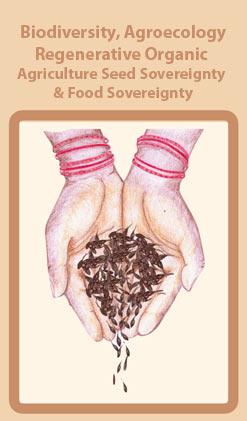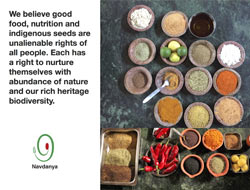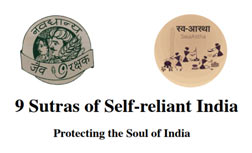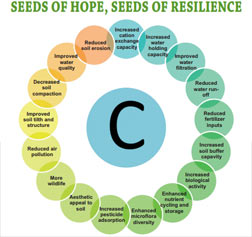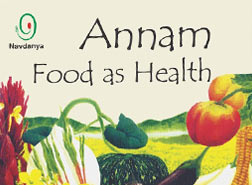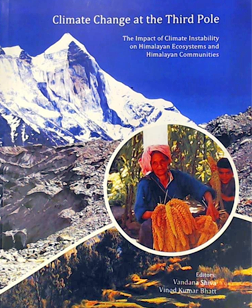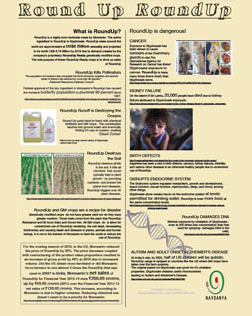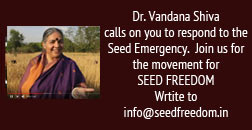I. Bija Swaraj (Seed Sovereignty)
- Swa-adhyan (Self Study) – become aware that all life begins as seeds and seeds as sources of life have their sovereignty and integrity and rights to evolve and not be pushed to extinction. Know the SEED. Study the difference between local, desi seeds and GMO and hybrid seeds. Know about and study local seed varieties in and around your area and make a Community Seed Register; celebrate indigenous knowledge and wisdom
- Swaraj-build a Seed Bank preserving the local indigenous seeds of your community against corporate greed of patenting and stealing indigenous knowledge
- Swadeshi– start a Seeds of Hope program in which you provide emergency supply of indigenous varieties of seeds in those regions, which are worse effected either by natural calamities like cyclones or as a result of faulty government policies
- Swadeshi - advocate (local) seeds and local organic farming practices in your area
- Satyagraha -Be Vigilant - learn about and monitor the activities of the big agri-businesses and the Poison Cartel in your area
- Satyagraha -Boycott and encourage others to boycott Genetically Modified Seeds and their products.
- Satyagraha - Boycott the poison cartel that own the world’s seeds and pesticides companies as well as biotechnology industries; the companies that have merged into the big 3 are Bayer with Monsanto, Syngenta with ChemChina, Dow Chemical (former Union Carbide) with Dupont,; thus 3 giants have gained control of 60% of the world’s seeds and 70% of the chemicals and pesticides
- Sarvodaya - Support Fibers of Freedom- choose clothes that are made from organic natural material and which give the farmers and producers fair price for production
- Sanmati - Honour and celebrate initiatives that people are taking to create poison free, GMO free, patent free, fossil fuel free, corporate control free local food systems and local food communities in your area, including initiatives for seed saving, organic farming, urban and school gardens, local farmers markets, Community Supported Agriculture and ethical purchasing groups
- Launch a Satyagraha- civil disobedience movement against biopiracy as in the case of neem and basmati in India. Defend and uphold Section 3j of the Indian Patent Act, 1970 which does not allow patents on “plants and animals in whole or any part thereof other than micro-organisms but including seeds, varieties and species and essentially biological processes for production or propagation of plants and animals” and Article 39 of the Protections of Plant Varieties and Farmers Rights Act, 2001 which states that a “farmer shall be deemed to be entitled to save, use, sow, resow, exchange, share or sell his farm produce including seed of a variety protected under this Act in the same manner as he was entitled before the coming into force of this Act”. Join the satyagraha to boycott the patent regime and any law that tries to patent indigenous seed and seed knowledge and tries to make it illegal for farmers to have their seed, save, and sell their seed II. Anna Swaraj (Food Sovereignty)
- Swa-adhyan (Self Study) – food is the currency of life and the flow of nutrition weaves the web of life. Become nutrition literate; learn about the impact of loss of biodiversity, thus the diversity of nutrients in our diet that are essential to our health.
- Soham (interconnection) -create links between schools, hospitals, health care centers and local organic fresh diverse food systems
- Satyagraha -Demand labelling of chemical additives and GMOs in your food on the basis of fundamental right to know
- Swadeshi - eat fresh, eat local, eat organic and eat diverse for your health and local food and nutrition security
- Swadesh- Advocate and urge your local government to create farmers market and increase access to local fresh food and produce
- Revive the legacy of forgotten local grains and food culture
- Sarvodaya - through Eating Fair and ensuring a fair share of what you spend reaches the farmers you can help end farmers’ suicides
- Shramdaan- build Gardens of Hope in your home, your locality, your community. Schools can start Edible School Yards (Sagwari), residential communities can start Community Organic Gardens, families can start Kitchen Gardens, Roof Top Gardens and Micro Gardens in balcony
- Swadeshi- organize Harvest of Hope gathering to celebrate the joys of seasonal eating from the harvest of your garden of hope and/or local producers
- Shramdaan- organize food drives and become a regular food bank or community kitchen volunteer
- Soham- Don’t waste food and visit area restaurants and businesses and ask if you can take their unsold food to food banks.
- Satyagraha - Boycott industrially processed food which adds more toxins to food through preservatives, to prevent them from rotting; colourants, to make food more attractive or natural; taste enhancers and flavors to increase palatability or impart a certain flavour; texturants: to give a particular texture to the food; and stabilizers to increase shelf life and each stage introducing more diseases causing toxins
- Satyagraha- Boycott international junk food chains and products such as Pepsi, Coke, Nestle which use products from industrial farming for industrial processing. Industrial junk food poses a grave threat of chronic diseases that are often described as ‘Lifestyle Diseases’ but are in reality driven by a faulty food system. Make your home, your institution, your community Junk Food Free III Jal Swaraj (Water Sovereignty)
- Swaraj – Water is the basis of life. Rivers have rights. Water is a commons, everyone has a right to water
- Satyagraha- power of one- carry a reusable non-plastic bottle with you at all times and thus uphold water as a common
- Satyagraha- power of one- use a bamboo straw or steel straw as plastic drinking straw production contributes to petroleum consumption and is filling our oceans with plastic
- Satyagraha- power of one- choose cleaning products that are natural and don't send chemicals into our waterway through e.g. detergents, soaps and cleaning liquids
- Satyagraha- power of one- harvest “grey water” which is the water draining from your house’s sinks, bathtubs, and laundry machine, and which can be used to water plant and to not waste water while washing, bathing or cooking
- Sanmati - advocate for water as a commons that is community ownership of water and ensuring access to clean, free and easily available water for all
- Swaraj- set up community water harvesting units and restore the conventional methods of water conservation like Baolis, Jhods, Ponds, Tankas
- Swadeshi - eat and grow water conserving, nutritive indigenous local grains like millets which are water prudent and return organic matter into the soil to conserve and make the soil a water reservoir . Stop eating and growing water and chemical intensive crops which have created the water emergency
- Satyagraha - Civil Disobedience -fight water privatisation and commodification of water; from big river linking projects to bottled water for consumption; resist, boycott and petition against these actions
- Make polluters pay- factories discharge harmful chemicals directly into nearby water bodies or open lands. This causes both water and soil pollution. Many factory wastes are not treated properly and are just thrown away directly. Be vigilant and take necessary legal actions against these ecological offenders
- Satyagraha -Boycott and don't fund the water-grabbers which means companies and investors that buy up land around the world and contribute to water scarcity and pollution. They sometimes deny local people access to water, pollute watercourses or exhaust supplies. This can affect the ability of local communities to farm and access safe drinking water
- Soham (interconnectedness)- the Chipko movement taught us that natural forests in the catchments are the mothers of our rivers and they need to be protected as sources of water. In cities, instead of Public Private Partnership (Privatisation of water) advocate for Public-Public partnership (Public and Government) as an alternative for solving the water crisis
- Satyagraha- Campaign to protect the ocean - 70% of the oxygen in the atmosphere is produced by marine plants IV. Van Aur Bhu Swaraj (Forest & Land Sovereignty)
- Swa-adhyan (Self Study)- become aware of India as an aranya sanskriti with the forests as the basis of our ecological civilization, our knowledge, our democracy. Mother Earth has rights; forests have rights. Know the rights of the earth and your rights especially with regards to land acquisition, indigenous land rights and Forest Rights Act and Forest Protection Act
- Sanmati – learn and celebrate the diverse forest cultures of our adivasi communities as well as community initiatives that have successfully addressed desertification such as integrated forest and costal management
- Satyagraha – power of one- use all reusable plates, (silverware, steel), napkins, etc. (including when you get take outs). Also stop using aluminum foil which relies on bauxite mining as well as plastic cling film
- Satyagraha – power of one- globally, percent of all timber is used to make paper products, and the demand for paper increases by two to three percent every year, so use less paper and as much as possible recycle paper. Also use fabric for gift-wrapping
- Satyagraha – power of one- segregate your waste so as not to create toxic landfills. Recycle organic waste in your home and community to make a compost
- Swaraj- Create deep participatory living democracies through organising people of your community (village or city) into a Jaiv Panchayat (Living Democracy) and to become decision-making body on all matters pertaining to the conservation, management, and protection of all biological and natural resources of your region
- Shramdaan – to uphold the concept of Soil not Oil , start a community vermi-compost pit to return to the soil what you have taken from it and say no to poisons -in your garden or farms or food that you eat
- Sanmati – celebrate crop diversity and promote multi-cropping and other local sustainable farming practices to maintain and rejuvenate the soil
- Soham (inter-being)- plant and look after trees and support the carbon cycle (wherein photosynthesis deposits its carbon wealth in the soil). Remember the carbon cycle of the lithosphere has its constructive impression on whole of the biosphere, weaving life everywhere
- Satyagraha -Boycott palm oil and products with palm oil, which is one of the biggest threats to rainforests. Its use displaces indigenous peoples and diverse species from their land, creates massive carbon emissions, and contributes to forced and child labour while also eroding soil
- Swadeshi- protect our forests by using eco-friendly wood alternatives such as bamboo, reclaimed wood, cork or salvaged wood
- Satyagraha - Civil-disobedience- join and support peoples’ movement for protection of forests, indigenous people and their land rights and petition the government to not sacrifice the earth and all living beings in the name of development
- Satyagraha -stand up for the natural rights of adivasis the first indigenous people, of our country, as recognized in PESA as well as the Forests Rights Act. The adivasis are the first earth citizens and the first practitioners of earth democracy and are threatened by large scale uprooting, dismantling and are illegally being made refugees in their homes. Deforestation and land grab are undermining both the living democracy and living economies the adivasis have practised over millennia. Join the satyagraha to resist the grabbing of their land, their forests and them being converted into refugees. Deforestation destroys the lives of millions of indigenous people. In many remote areas, large international corporations under the cover of corrupt governments intentionally violate the rights of local communities. When indigenous people are given equal rights and their traditional lands are respected, the incidence of (illegal) deforestation decreases, as they are able to legally fight for protection of their forests V. Gyan Swaraj
- Swa-adhyan- life is intelligence and all cultures have had knowledge to uphold the diversity of knowledge systems of India as well as Convention on Biological Diversity and the Biodiversity Act which protects our diversity and knowledge. Become informed
- Soham- move away from an anthropocentric world view towards a world view of inter-being while taking any major or minor decision in your life
- Swa-adhyan – learn distinguishing between green washing and legitmate sustainability standards
- Satyagraha- resist the patenting and biodpiracy of biodiversity, seed and indigenous knowledge
- Soham - promote Living Knowledges that maintain and renew living processes and contribute to the health of the planet and people. No person or corporation has a right to enclose, monopolize patent or exclusively own as intellectual property on living knowledge
- Satyagraha- boycott Frankenstein Technology such as genetic engineering, synethetic meat, robotic bees for cross pollination and the cloning of organisms that are “the ultimate expression of the commercialisation of science and the commodification of nature.… Life itself is being colonised
- Sanmati - collect, archive and record indigenous knowledge and wisdom for community use and as a cherished common
- Digital Satyagraha: be critical media literate; know how to verify the onslaught of fake information and news coming your way and spread awareness about media literacy in your community as well
- Decolonise your mind and work towards dismantling the hierarchy of knowledge. Encourage learning institutes, teachers, and yourself to challenge ‘epistemicide’ that is the failure to recognise, or the silencing, of other knowledge systems and the different ways in which other people run their lives and provide meaning to their existence
- Nai Talim – connect education to knowledge of the earth, food, and interconnectedness of life, as promoted by Gandhi ji’s “true education of hand, heart and head” VIII Shakti - Ecofeminism
- Swa-adhyan- we are part of an interconnected living world of diversity with all beings having equal rights. As Earth Citizens we must become aware of the creativity and contributions of women and nature, something which was denied by capitalist patriarchy which defined nature as inert and dead matter to be exploited, and women as passive objects to be dominated. Shakti is the feminine power of the universe. Consciousness of Shakti helps us respect women and discover our own inner nonviolent power in creative form
- Sanmati- uphold and celebrate diversities and differences - the capitalist patriarchy perspective interprets difference as hierarchical and uniformity as a prerequisite for equality. Thus mono cropping and monoculture become a hallmark of maldevelopment practices that must be challenged and resisted
- Swaraj- join or start a Mahila Anna Swaraj group which celebrates and rejuvenates women’s knowledge and skills in biodiversity conservation, sustainable agriculture and food production and in artisanal organic food processing
- Organise Grandmothers’ University to celebrate women’s traditional knowledge in biodiverse food, health and nutrition of your community
- Swadeshi – become aware of women’s circular regenerative economies of caring and sharing which are necessary for both sustainability and justice and for leading the transition to our future
- Use ecological menstrual products such as organic pads, menstrual cup, cloth pads or sea-sponge tampons
- Sarvodaya- support women self help groups and farmers, as women have a strong material link to the environment because globally they represent the majority of those working in small-scale farming, as well as resource management around water and wood
- Women and climate action - ensure key decision-makers understand how environmental degradation and climate change affect women differently than men
- Women and climate action - include women in the creation of policies and strategies around environmental protection including disaster response; building resilience; securing land and inheritance rights, food, and resources; and ending energy poverty
- Women and climate action - promote gender-responsive approaches to climate financing
- Advocate for Rights of Mother Earth. Go beyond mechanistic reductionism, which is such a false construction in science, to a science of interconnectedness, a science of relationships, a science knowing about the fragility of the different connections and being deeply aware of it, to provide guidance on how not to harm Mother Earth. This then starts to change the categories of intelligence and stupidity VI Climate Action
- Swa-adhyan – The Earth is a living, self organised system. Educate yourself about how violence against the earth’s self regulatory systems has caused climate change and assess the impact of climate change in your locality, region and country.
- Satyagraha – For Soil, Not Oil. 50% of GHG’s leading to climate change come from industrial agriculture. Biodiverse organic farming is a climate solution. Campaign to produce a shift from an oil-based, capitalist-based civilization to a biodiversity-based ecological civilization. Inspire, educate and raise awareness on how our everyday consumer behavior affects our local environment and planet, introduce people to actions they can implement into their daily routine to reduce their negative environmental impact
- Satyagraha -Boycott - join a local Fossil Fuel Free, Poison Free campaign. Help stop the financing of multinational fossil fuel companies and the Poison Cartel which depends of Fossil Fuels
- Petition your representative that instead of handing our taxes to dirty fossil fuel companies and the poison cartel you want the money to be invested in regenerative agriculture and renewable energy
- Satyagraha – power of one- use sustainable transportation, such as bicycling, or use public transportation more often. In the case of long-distance travel, trains are more sustainable than airplanes
- Shramdaan- practise the power of one by collecting your discarded paper, glass, plastic, and electronics to your local recycling center
- Avoid on-line shopping and boycott shopping from online portals which use excess plastic while packing and shipping product to your home 78. Sanmati - replace screen time with socializing, creating, learning, art, and exercise so that you consume less energy as well as learn to foster ecological consciousness
- Satyagraha- practise the principle of reuse & reduce by mending & repairing rather than discarding and replacing products
- Protect the bees and support sustainable bee-keepers
- Climate change is the fundamental design problem of our time, thus when building any new E home, schools and offices one must look at ecological design alternatives (Eco-design) by optimising natural material and bio mimicking design patterns to live in synch with the planet
- Satyagraha - attend an event (such as a march or rally) organised to raise visibility for climate change action and/or pressure elected officials to respond to the issue. Show your support for programs and organisations including community and citywide actions that are fighting climate change, and organisations working on the ground to make a difference
- Be a climate voter – only vote for candidates who accept the science of climate change and are committed to addressing it
- Lobby for international legally binding agreements obliging countries to support climate refugees and migrants. It is estimated that, by 2050, between 150 to 200 million people are at risk of being forced to leave their homes as a result of desertification, rising sea levels and extreme weather conditions
- Lobby for education institutions to become poison free, fossil fuel free so that the next generation learns how to live sustainably from the onset
- Use energy wisely - change to energy-efficient light bulbs, unplug computers, TVs and other electronics when you’re not using them and look for the Energy Star label when buying new appliances VII Economy, Governance and Peace
- The economy is derived from ecology, living economies that sustain the earth, her diversity and ecosystems. As Gandhi reminded us “the Earth has enough for evryone’s needs but not for everyone’s greed”. Make this Gandhian adage a motto for your life: “Live simply so others can simply live.”
- Swaraj- shift from linear economy to circular economy in your personal choices where the life cycle of a product you consume is assessed by the cradle to cradle principle based on 5 elements, namely material health, material reutilisation, renewable energy, water stewardship and social fairness
- Implementing the sharing economy: Establishing platforms for sharing for your community, some objects are not necessary to be owned by every household, utilising what your neighbour has and offering what you have to others establishes a spirit of community and enforces the goal of sustainable production and consumption
- Honour Bread Labour - the hard working honest people, like farmers, workers in self-organised economies are not just being pushed into deep poverty, they are, in fact, being criminalised by labeling their self-organised economic systems as “black”. Thus we must challenge laws that are stealing the dignity of bread labour
- Satyagraha -agitate and petition your governments so that they look at all policies related to agriculture, food, nutrition and health in an integrated manner on the basis of their interconnectedness
- Satyagraha - petition and advocate with the United Nations and other relevant global bodies to generate policies to reduce pesticide use worldwide and develop a framework for the banning and phasing out of highly hazardous and toxic pesticides as a matter of urgency
- Shift global indicators from Gross Domestic Product (GDP) to Gross National Happiness (GNH), learning from the Gandhian principles of Swaraj, Swadeshi, Satyagraha & Sarvodaya & the post growth concepts of happiness and wellbeing that have emerged from Bhutan
- Honour and maintain the health continuum - from the soil, to the plants, to our bodies. Chemical farming depletes the soils of nutrition, producing plants that are nutritionally empty but full of toxic residues, which cause us – their consumers – to suffer from diseases related to nutrient deficiency and/or toxins. Thus we are what we eat and must create access to healthy food for all as a national health policy
- Make sustainable investments- check out the list of member banks of the GABV (the Global Alliance for Banking on Values) to make the right choice for the future
- Petition your government or collaborate with NGOs to train communities in water harvesting, waste management and ethical consumption for sustainable peace
- Work towards declaring your cities and villages as Poison Free, Fossil Fuel Free, GMO free, Debt and Suicide Free zones
- Get your local government involved in creating city-scaled community gardens
- Practise Swaraj - become a free citizen, self-organising, self-governing, with a full sense of responsibility that comes from being part of a community, part of a country, part of the planet
- Practise Care and Compassion- earth democracy connects people in circles of care, cooperation and compassion instead of dividing them through competition and conflict. Earth democracy globalizes compassion, not greed; peace, not war.


